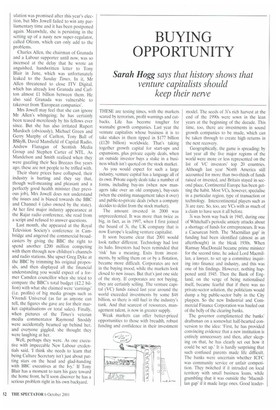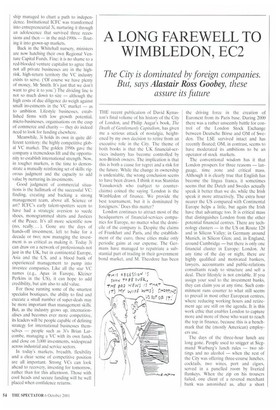BUYING OPPORTUNITY
Sarah Hogg says that history shows that
venture capitalists should keep their nerve
THESE are testing times, with the markets scared by terrorism, profit warnings and cutbacks. Life has become tougher for wannabe growth companies. Last year the venture capitalists whose business it is to take stakes in them tipped in $177 billion (£120 billion) worldwide. That's taking together growth capital for start-ups and expansions, plus private equity deals, when an outside investor buys a stake in a business which isn't quoted on the stock market.
As you would expect for such a large industry, venture capital has a language all of its own. Private equity deals take a number of forms, including buy-ins (when new managers take over an old company), buy-outs (when the existing management takes it over) and public-to-private deals (when a company decides to delist from the stock market).
The amount invested in 2000 was unprecedented. It was more than twice as big, in fact, as in 1997, when I first joined the board of 3i, the UK company that is now Europe's leading venture capitalist.
It soon became clear that 2001 would look rather different. Technology had lost its halo. Investors had been reminded that 'risk' has a meaning. Exits from investments, by selling them on or by a flotation, became more difficult. Corporates are not in the buying mood, while the markets look closed to new issues. But that's just one side of the story. If corporates are not buying, they are certainly selling. The venture capital (VC) funds raised last year around the world exceeded investments by some $48 billion, so there is still fuel in the industry's tank. And that scarcest of resources, management talent, is now in greater supply.
Weak markets can offer better-priced opportunities to those with breadth, robust funding and confidence in their investment model. The seeds of 3i's rich harvest at the end of the 1990s were sown in the lean years at the beginning of the decade. This time, too, there are investments in sound growth companies to be made, which can be taken through to create high returns in the next recovery.
Geographically, the game is spreading: by last year all the five major regions of the world were more or less represented on the list of VC investors' top 20 countries. Although last year North America still accounted for more than two-thirds of funds raised or invested, and Britain stayed in second place, Continental Europe has been getting the habit. Most VCs, however, specialise in a particular region, type of transaction or technology. Intercontinental players such as 3i are rare. So, too, are VCs with as much of a claim to have seen it all before.
3i was born way back in 1945, during one of Whitehall's periodic anxiety attacks about a shortage of funds for entrepreneurs. It was a Caesarean birth. The 'Macmillan gap' in funding had been identified (almost as an afterthought) in the bleak 1930s. When Ramsay MacDonald became prime minister for the second time, he asked Lord Macmillan, a lawyer, to set up a committee inquiring into finance and industry, and this was one of his findings. However, nothing happened until 1945. Then the Bank of England, on the verge of being nationalised itself, became fearful that if there was no private-sector solution, the politicians would dump a big public-sector baby in the City playpen. So the new Industrial and Commercial Finance Corporation was hauled out of the belly of the clearing banks.
The governor complimented the banks' draftsman on a somewhat half-hearted conversion to the idea: 'First, he has provided convincing evidence that a new institution is entirely unnecessary and then, after sleeping on that, he has clearly set out how it could be set up.' It is hardly surprising that such confused parents made life difficult. The banks were uncertain whether ICFC was community service or unfair competition. They twitched if it intruded on local territory with small business loans, while grumbling that it was outside the 'Macmillan gap' if it made large ones. Good leader
ship managed to chart a path to independence. Institutional ICFC was transformed into entrepreneurial 3i, nurturing it through an adolescence that survived three recessions and then — in the mid-1990s — floating it into grown-up markets.
Back in the Whitehall nurserr.,,, ministers are now hatching their own Regional Venture Capital Funds. Fine: it is no shame to a red-blooded venture capitalist to agree that not all private businesses are in the highrisk, high-return territory the VC industry exists to serve. (`Of course we have plenty of money. Mr Smith. It's just that we don't want to give it to you.') The dividing line is not so much down to size — although the high costs of due diligence do weigh against small investments in the VC market — as to ambition. Lifestyle businesses, established firms with low growth potential, micro-businesses, organisations on the cusp of commerce and charity — they do indeed need to look for funding elsewhere.
Meanwhile, 3i holds its own in quite different territory: the highly competitive global VC market. The golden 1990s gave the company a tremendous lift and the opportunity to establish international strength. Now, in tougher markets, is the time to demonstrate a mutually reinforcing set of skills: rigorous judgment and the capacity to add value by nurturing its investments.
Good judgment of commercial situations is the hallmark of the successful VC: finding, creating and backing a strong management team, above all. Science or art? ICFC's early talent-spotters seem to have had a strategic aversion to suede shoes, monogrammed shirts and Justices of the Peace. It's all more scientific now (no, really. . . ). Gone are the days of hands-off investment, left to bake for a decade or two; now managing the investment is as critical as making it. Today 3i can draw on a network of professionals not just in the UK, but in continental Europe, Asia and the US, and a blood bank of experienced management to pump into investee companies. Like all the star VC names (e.g., Apax in Europe, Kleiner Perkins in the US), it can hope to add credibility, but aim also to add value.
For those running some of the smartest specialist boutiques, the ability to find and execute a small number of super-deals may be more important than management skills. But, as the industry grows up, internationalises and becomes ever more competitive, its leaders will be people capable of defining strategy for international businesses themselves — people such as 3i's Brian Larcombe. managing a VC with its own funds and close on 3.000 investments, widespread across industrial and service sectors.
In today's markets, breadth, flexibility and a clear sense of competitive position are all important. Strong VCs can look ahead to recovery, investing for tomorrow, rather than for this afternoon. Those with cool heads and secure funding will be well placed when confidence returns.



































































































 Previous page
Previous page